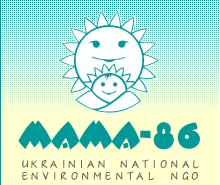Seminar “Public participation in improvement access to safe drinking water and sanitation in the rural areas of Ukraine”
On September 20, 2006 within the framework of IV International Water Forum "AQUA Ukraine — 2006" the seminar “Public participation in improvement access to safe drinking water and sanitation in the rural areas of Ukraine” took place. The seminar was conducted by All Ukrainian Environmental NGO “MAMA-86” together with NGO “Women in Europe for a Common Future” (WECF) and with support of Ukrainian Water Association. More than 100 representatives of different stakeholders took part in it. Among them there were national and local authorities, representatives of science, water utilities, rural communities, NGO’s. The delegation of partner NGOs from Karakalpakstan and Armenia, who is dealing with drinking water and sanitation problems in rural areas of these countries, attended this seminar too.
The main goal of the seminar was to present and to discuss the results of tree-years project “Cooperation for sustainable development of rural areas: water supply, eco sanitation and organic agriculture”, which is carried out by NGO “MAMA-86” in partnership with WECF. The project is funded by MATRA program of the Ministry of Foreign Affairs of the Netherlands. Representative of the Ministry of health protection of Ukraine Galina Valyavska and representative of State committee of water resources management, Yuriy Yakovenko presented the official views of the situation on water supply and waste water sector of Ukraine. Project team of NGO “MAMA-86”, WECF, regional organizations from Yaremche, Nizhyn and Poltava presented the results of project activity in two directions: improving of water supply and sanitation provision of population in 3 project villages. Project activity includes wide range of arrangements: investigation of local situation, informational and educational work at communities and local authority level, public participation in decision-making process and implementation of immediate and long-term technical solutions on rural water supply and sanitation.
It was pointed that in informational and educational work the population of 3 project villages (almost 8.5 thousand people) was involved. Almost 700 rural inhabitants have got direct benefit from realization of water supply pilot projects. In Vorokhta installation of 195 m extra branch pipe gave an opportunity to 100 inhabitants of the village central part to connect up to the centralized water supply. 5 public wells used by 100 inhabitants for drinking purposes were cleaned up. In v. Bobryk 2 school wells were fixed and in v. Vertijivka was built a pore to supply kindergarten by water. In Gozhuly public well used by 98 families (280 inhabitants) was repaired. Due to public hearings and work of villages’ public comities the issue of water-pipe rehabilitation in Gozhuly and Vorokhta was moved up by catching the attention of local and region authorities and governmental structures to the local water supply problems. In the result of successful lobbying in 2005 the state budget was allocated for replacing of main water-supply pipes of Gozhuly and Vorokhta and near 2000 inhabitants of these project villages improved the access to drinking water.
Almost 2/3 seminar time was devoted to problems of waste water management in rural area , presentation of ecosan technologies and the results of 9 pilot projects dealing with dry urine-diverting toilets, which were realized in the framework of MATRA project. There also were invited well-known experts on ecosanitation: Professor Ralf Otterpohl, Hamburg Technological University (TUHH), lecturing about ecosanitary development in the world; Martina Hammer, TUHH expert, lecturing on problems of PhaR degradation: advantages and disadvantages of traditional and ecosanitation technologies of utilization; Gunnar Noren, executive secretary Coalition “Clean Baltic”, lecturing on sustainable waste water management in Baltic Sea basin. Kajetan Hetzer, representative of SNS REAAL presented new bank initiative — Water Fund aimed at realization of water projects based on microcredits in different countries of the world, including Ukraine. Experts’ presentations caused keen interest, questions of seminar participants and contributed into the discussion of the MATRA pilots results.
During the discussion the representatives of project team from “MAMA-86” and WECF pointed problems, discovered during project implementation. Among them are: ignoring of existed water and wastewater problems and the lack of adequate attention at all governmental levels to situation with waste water and wastes utilization in rural area; low level of public awareness on water supply & waste water system maintenance and hygiene rules holding, lack of actual information and knowledge, absence of skilled staff and financial resources to solve problems at local level. The aim of broad public awareness rising activities on drinking water and health problems and links, hygiene promotion among rural population, especially among women and children, still remains actual. One of the drinking water problems in Poltava rayon is fluorine natural contamination and the children health effects, which was discovered in v. Gozhuly and is needed the cooperation to find the adequate urgent solutions.
Seminar participants pointed that introduction of new ecosanitation technologies needs cooperation of all stakeholders, exchange of information and introduction experience, local experts capacity building, financial support; legislation development by adapting/upgrading of sanitary and building standards and norms; development of technologies’ market and domestic manufacture of special sanitation equipment.
Seminar participants have got final project publication — the Report on the results of project “Cooperation for rural sustainable development”, other informational materials, published during MATRA project and all expert seminar presentations.
















